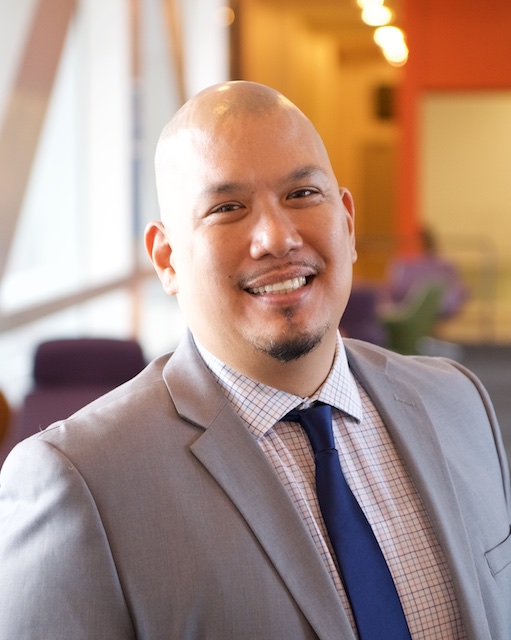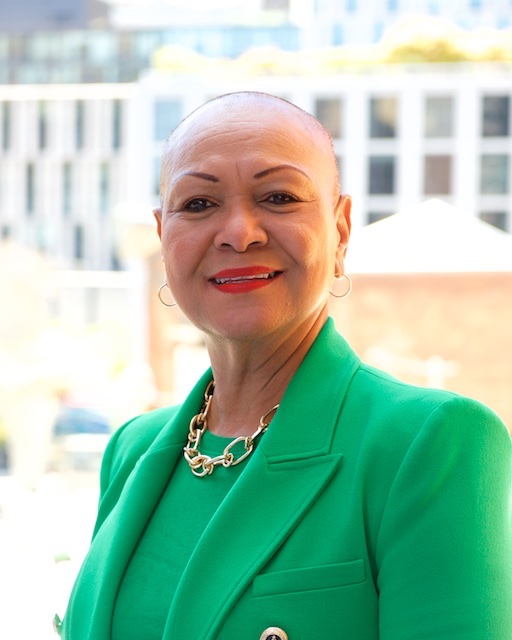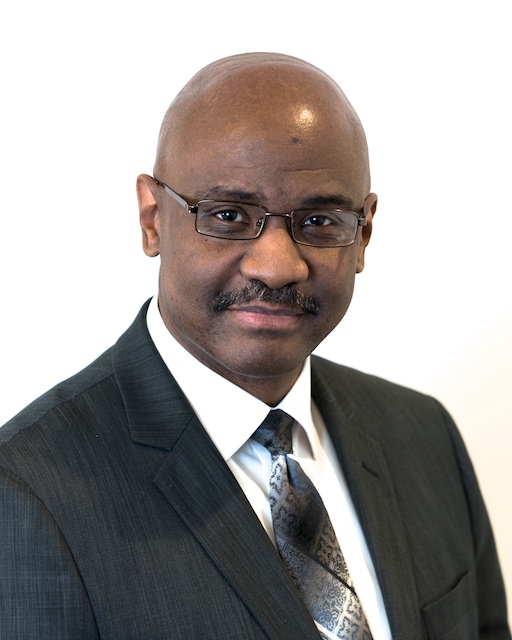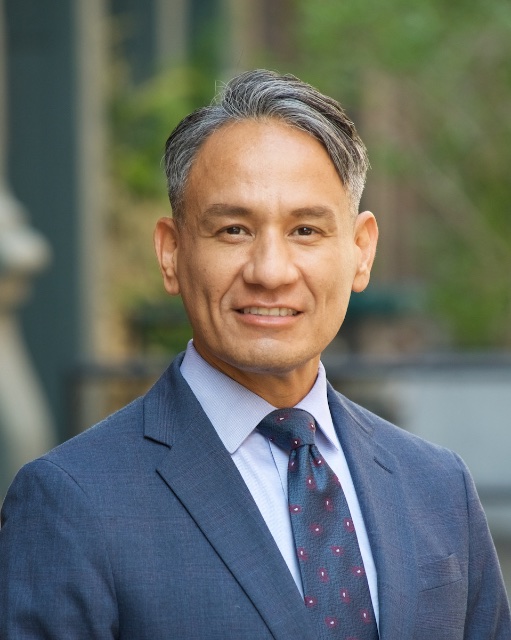May 10, 2022
Attending virtually and in person, fitting classwork and dissertation research around full-time jobs and family responsibilities — not to mention, the grave challenges presented by a global pandemic — five members of the Borough of Manhattan Community College (BMCC/CUNY) community have completed the Doctor of Education, Administration and Supervision (Ed.D.) program at St. John’s University in Queens, New York, and will cross the stage to receive their degree on May 17.
The mission of the St. John’s University School of Education is to prepare professionals and scholars who will advocate for equitable, ethical education. Dissertations completed by the BMCC cohort reflect St. John’s mission, as well as BMCC’s promise to deliver a quality education to all students.

“The Stereotype Threat Experiences of Men of Color Persisting at Community College” is the dissertation written by Ed.D. graduate Robert E. Cortes, Assistant Director of Outreach and GAINS Program Manager in the BMCC Counseling Center.
One of three recipients of the 2022 Dr. Gene Geisert Outstanding Dissertation Award by the St. John’s University School of Education, Dr. Cortes says that “Through coursework, wonderful professors, current social justice issues and the political climate under the Trump administration — as well as my own academic experiences across my lifetime — my topic emerged.”
Moving forward, he plans to continue in a role he describes as “a servant leader, one who creates genuine connections with students, staff and colleagues and inspires others to achieve wonderful things and recognize their full potential. I am committed to student success from a holistic perspective and hope to accomplish my own aspirations in a leadership role.”

Michael C. Liu, Adjunct Faculty in the BMCC Department of Ethnic and Race Studies, completed research for the dissertation, “How Arts Integration Affects College Teachers and Students’ Culture Competence: A Grounded Theory Research.”
Using a qualitative research method, Dr. Liu created a theoretical framework to help people reflect on how arts integration can affect teachers’ and students’ experience in higher education.
“The results of my study showed how artistic experience in class can influence students’ cultural competence and teachers’ culturally responsive teaching,” he says.
Now possessing an Ed.D., Dr. Liu says his plans are “to do what I enjoy — teaching and acting.”
He is also working to put into action, “a new set of tools that enhance the rigorousness of my process. I look froward to discussing with any and every one, how to bring more arts integration into the curriculum for non-arts majors in higher education.”

Deborah Harte, Director of BMCC’s Advocacy and Resource Center (ARC), wrote the dissertation, “Food Insecurity Among College Students Who Are Parents Attending a Community College: A Qualitative Case Study.”
Having led a number of food distribution programs at BMCC for students in need, Dr. Harte entered her doctoral research with a strong sense of what she wanted to focus on.
“My research addressed two questions,” she says. “First, what are the experiences, related to food insecurity, of community college students who are parents? Secondly, what is their perception of the role of community colleges in providing supports for students experiencing food insecurity?”
As part of her research, Dr. Harte interviewed students who expressed that they and their children have experienced a lack of food for a period of time ranging from four days to up to two weeks in a given month, and found that “most of the students indicated that they felt the school offered supports that help them to persevere.”
As she looks ahead, Dr. Harte says, “I would like to continue to work with the population I studied in a more comprehensive manner; developing a respite program, for example. Additionally, I would like to publish some aspects of my study as I believe the data that was gathered could be helpful to institutions nationally.”

Harry Mars, Director of Student Activities in the BMCC Office of Student Affairs, wrote the dissertation, “The Impact of Participation in Co-curricular Activities on Academic Performance and Retention Utilizing Data Collected for the Co-Curricular Transcript.”
This quantitative study included all of the students who participated in one of the following activities during the 2018-2019 academic year: club member, club leader, leadership training, and being mentored by a peer.
Applying the data-analysis strategy of multiple regression — which analyzes the relationship between a single dependent variable with several independent variables — Dr. Mars tested the impact of participation in these activities on Grade Point Average (GPA). In addition, he says, “A binomial logistic regression — a data-analysis strategy applied to just two variables — was run to test the impact of participation on one-semester retention.”
Results of his research supported earlier findings affirming that participation in co-curricular activities positively impacts students’ GPA and one-semester retention. “I plan to share my new knowledge to enhance my contribution to BMCC and to endeavor to advance my career by taking a more senior position in the administration,” says Dr. Mars.

Manny Romero, Executive Director of the BMCC Office of Public Affairs, wrote the dissertation, “Cracking the Code to Effective Marketing in Higher Education: A Case Study of Recruitment and Retention of First-Generation, Latinx Community College Students.”
“With the guidance of my mentor Dr. Catherine DiMartino, I was able to narrow my focus to specific areas of marketing and communications,” says Dr. Romero. “My topic became more defined as I continued to take courses and explore different research methods and theoretical frameworks.”
He describes his research: “With a growing Latinx population in the United States, college recruitment must involve building connections with the Latinx community and establishing trust between Latinx students and the institution. This qualitative case study explores the communications and marketing strategies of a New York-based community college used to recruit Latinx students, and the relationship between student perception and the institution’s marketing practices addressing the needs of Latinx students.”
As part of his study, Dr. Romero used theoretical frameworks and concepts that examined marketing practices administered by U.S. and international organizations, “as well as research focused on the first-generation, Latinx college student experience, customer-based marketing and the effects on college recruitment marketing during the COVID-19 pandemic.”
Where does he plan to take his new degree? “I hope to do more research in the future,” says Dr. Romero. “I enjoyed the work involved; the writing and conducting the interviews. I hope this degree will lead to leadership opportunities in higher education.”
Challenges of being a returning adult student, and benefits of the cohort model
The St. John’s Ed.D. program is based on the cohort model, which benefited the graduates as they faced various challenges to attaining their degrees.
Dr. Harte sums it up: “I love cohort programs,” she says. “I especially love the St. John’s model. Having colleagues in the cohort who understood the challenges, people to lean on when you are tired or when you’re experiencing periods of doubt, is priceless. Moreover, having the committee that I had: Dr. Catherine DiMartino (Chair), and Drs. Ceceilia Parnther and Stephen Kotok (committee members) was invaluable. I cannot speak enough about the encouragement and guidance that they offered. They made the journey easier.”
Dr. Harte also acknowledges that the timing, for this particularly cohort, was uniquely challenging.
“Coupled with juggling a demanding job and taking care of my family was having to deal with the COVID-19 pandemic and uncertainty caused by the virus — never knowing if or when I might become ill.”
Dr. Cortes describes some of the challenges of being an adult returning student in a recent LinkedIn post. In 2017, he writes, he started the doctoral program at St. John’s University “after 17 years being out of school and with a six-month-old baby boy at home.”
The birth of another son was followed by the loss of his father — “with no hospital visit, no wake, and no funeral allowed, due to Covid-19” — a tough time he says he moved through “with the support of my wife, my mother, my father (R.I.P.) and my sons, along with the comradery of great BMCC colleagues, the guidance of a compassionate and humane dissertation chair, Dr. Ceceilia Parnther, and my ‘dream team’ dissertation committee; Dr. Catherine DiMartino and Dr. Andre McKenzie — without them, my journey could have ended at any point before today.”
Reflecting on the academic rigor of doctoral-level investigations, Dr. Liu says that, “The most challenging part of the process was the internal, mental discussion that I had with myself. Lots of questions were asked. Not all of them were answered.”
Dr. Mars shares that “the challenging schedule of two weekly classes for the fall, spring and summer semesters was difficult but it was actually great attending class with the 12 members of the BMCC cohort. The difficult part for me was working on the dissertation afterward since we were no longer in regular touch with one another and we were each working separately with our dissertation mentors.”
Guidance in that process, says Dr. Mars, “was provided by my dissertation mentor, Dr. Joan Birringer-Haig, and the other dissertation committee members, Dr. Andre McKenzie and Dr. Katherine Aquino.”
Dr. Romero says that “managing work, the pandemic and our course of study was challenging. I suspect my other cohort members also felt the pressure to juggle many things at once during our doctoral experience. I think it was also challenging to put ourselves in a student mindset and learn how to navigate through the learning experience as a doctoral student. I’m very happy that I pursued it!”
The next wave of Ed.D. graduates is nearing their goal
This wave of Ed.D. graduates from St. John’s University at BMCC is followed by another wave from BMCC, set to graduate in a year or so.
Courses are offered on the Queens campus on weekday evenings and at the Long Island Graduate Center location during the weekend.
For information on the St. John’s Doctor of Education in Administration and Supervision program, please contact (Queens Campus) Dr. Catherine DiMartino, Chair and Associate Professor of Education Administrative and Instructive Leadership, dimartic@stjohns.edu, or (Long Island Graduate Center, LIGC) Dr. Anthony J. Annunziato, Director of LIGC and Clinical Associate Professor, annunzia@stjohns.edu.
STORY HIGHLIGHTS
- Five members of the BMCC community — Robert E. Cortes, Deborah Harte, Michael C. Liu, Harry Mars and Manny Romero — complete the Doctor of Education, Administration and Supervision (Ed.D.) program at St. John’s University
- Each graduate conducted dissertation research stemming from their passion and areas of expertise in higher education
- Challenges posed by the pandemic and juggling full-time work with family responsibilities were overcome through the supportive cohort model and advisors in the St. John’s University School of Education

